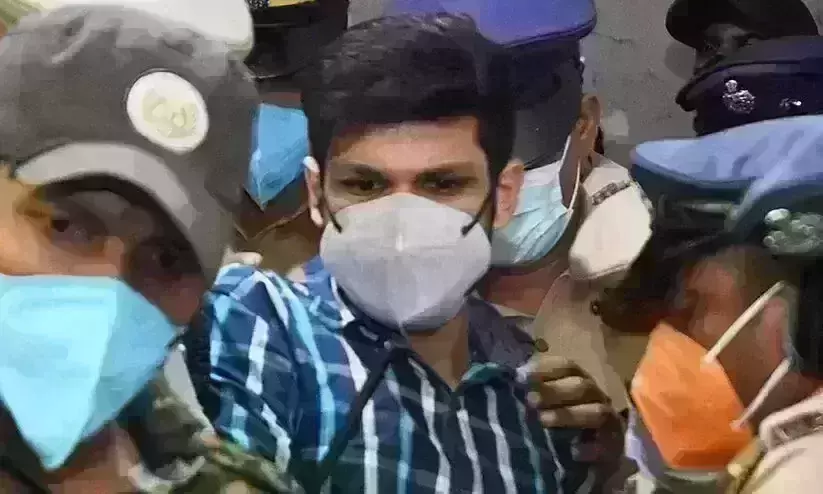

Man who killed wife using cobra awarded consecutive double life imprisonment by Kerala Court
text_fieldsKollam (Kerala): Man who killed his wife by inducing a homicidal snakebite was awarded double life sentence and and a five lakh fine by a sessions court in Kerala on Wednesday. The now convicted, Sooraj Kumar had killed his wife Uthra by letting a cobra bite her in her sleep in May last year.
As per reports this is the first case in the state where a live animal was used for murder and the very first case in the entire country where a man has been found guilty of murder using a snake.
The two similar cases which have been reported in the past resulted in the acquittal of the accused as their guilt could not be established. In the instant case, the Police had successfully cracked the case using a dummy reptile and recreating the entire crime scene following suspicion raised by Uthra's family as it was the second time she suffered a snake-bite in three months
The court on Wednesday said that the crime was "definitely diabolic, cruel, heinous and dastardly" and committed with "unparalleled wickedness". The court had on October 11 found that the husband guilty of murder, poisoning, destruction of evidence and also attempt to murder for his first try at killing her by using a viper.
The Kollam Additional District and Sessions Court,Judge-VI Manoj M in his over 450-page judgement, noted the prosecution's contention that the accused had on both occasions, when he used snakes to kill her, first given her sedatives by mixing it in a liquid and she "unsuspectingly drank it" by "mistaking it for love" when in fact he had given her a "poisoned chalice".
The court noted that the case did not fall in the rarest of the rare category for award of death sentence and instead the court awarded life imprisonment to for killing his 25-year-old wife Uthra using a cobra. The second life sentence was awarded for his initial attempt to kill her using the same method.
However, the court directed that the life terms would start only after he serves 17 years -- 10 years for poisoning his wife and seven years for destruction of evidence -- and as a result he would end up serving a major portion of his remaining life behind bars.
The court has issued a warrant for sending the convict to Central Prison, Thiruvananthapuram, where he now would be spending a major portion of his remaining life.
After the sentence was pronounced, PTI quoted Special Public Prosecutor (SPP) G Mohanraj saying that while the crime was termed as rarest of the rare by the court, it did not award the death penalty in view of the young age - presently 28 years - of the convict and the fact that he had no criminal antecedents.
He was also quoted saying that the state will decide later whether to go for an appeal or not.
Additional Public Prosecutor A K Manoj told PTI that Kumar appeared unperturbed when the sentence was read out while Superintendent of Police (SP) Harishanker, who led the investigation in the case, told reporters that the police and prosecution were satisfied by the verdict and sentence.
He said it is the court's discretion to decide the quantum of sentence and therefore, that cannot be commented upon.
However, the punishment awarded has been viewed as inadequate by many, including the victim's family and senior political leaders including KPCC president K Sudhakaran,BJP state president K Surendran.
The victim's mother said she was unsatisfied with the sentence awarded as she wanted the convict to be hanged till death and therefore, the family would press for an appeal. Speaking to reporters at her residence, she also said that it is such shortcomings in the Indian penal system which give rise to criminals like Kumar.
Leader of the Opposition in the state assembly V D Satheesan also said in a statement that the victim's family's demand for an appeal should be supported by the government.
Meanwhile, Kumar's lawyer, speaking to reporters after the sentence, on the other hand, said the decision was "immature" and "unjustified" as there was no evidence before the court to convict the accused.
The lawyer said according to him it was a "moral conviction" and his client would be appealing against the decision.






















